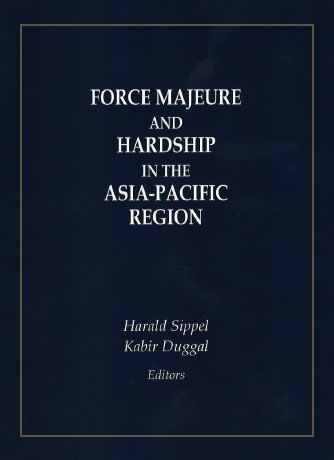
|
---------------------------------------------------------------------
[Paperback]
Editors: Harald Sippel, Kabir Duggal
Thailand Chapter Author: Narit Direkwattanachai
---------------------------------------------------------------------
PRICE:
Print US$ 175
PDF (Single-User License) US$127.50
---------------------------------------------------------------------
PRODUCT DETAILS:
Paperback: 690 pages
Published: January 2022
Language: English
ISBN: 978-1-944825-54-6
Product Dimensions: 24.5 x 16.5 x 4 cm
Shipping Weight: 1 kg
FRONT COVER [Zoom +]
BACK COVER [Zoom +]
---------------------------------------------------------------------
To Order:
Order directly from Juris Legal Information
https://arbitrationlaw.com/books/force-majeure-and-hardship-asia-pacific-region
---------------------------------------------------------------------
|
|
Description
“Force majeure" and "hardship" respectively describe situations where external, unforeseen, and unavoidable events make contract performance impossible, or where performance becomes significantly more burdensome.
In this timely new work, editors Harald Sippel and Kabir Duggal address this topic as it is understood among the most important economies in the Asia-Pacific region. Despite the impact and predictability of force majeure and hardship events in real-life business transactions, discussions of them remain scarce or are not discussed in a comprehensive and comparative manner. For the Asia-Pacific region in particular, information is very limited. Force Majeure and Hardship in the Asia-Pacific Region fills the void, providing country reports on 17 jurisdictions, written by a distinguished roster of practitioners.
There is no comparable book out there, allowing the reader to get an understanding on force majeure and hardship from Vladivostok in the far North to Auckland in the South, all the way to Islamabad in the West.
A detailed questionnaire provides a thorough overview of how such events are understood in each country, what the legal consequences for the contracting parties are, what the notice requirements are, and the remedies that may be available. A useful guidance note from the editors further outlines the critical steps to take should a force majeure or hardship event strike. The guidance note discusses when and how to reach out to counterparties and legal counsel, what tone of language and perspective to adopt, what to expect and what potential legal landmines to avoid.
Amid the uncertainty of these events this much-needed volume shows that the best avenue toward mitigating the effects of such disasters, before and after they occur, may be simply having access to the right information.
From the foreword:
...in the Asia-Pacific region more goods are produced than in any other part of the world. A few key substances such as rare earths, which among others, are essential for the production of catalysts, magnets and batteries, can only be found in this region.
A faltering of production at the beginning of the global supply chain will be felt throughout the entire supply chain and ultimately, by the consumer.
In framing 34 different questions covering force majeure and hardship, Dr. Harald Sippel and Dr. Kabir Duggal demonstrate their deep understanding of international dispute resolution and key issues in cross-border contracts. The detailed answers by leading practitioners allow the reader to quickly identify the key concepts in the treatment of force majeure and hardship events in each of the jurisdictions covered as well as any differences in their treatment. Knowing what the difference is, is of vital importance.
This book is a valuable and above all, practical contribution to the pressing issues raised by force majeure/hardship events and brought to the fore by the COVID-19 pandemic.
---Christopher Lau, Senior Counsel and Chartered Arbitrator, ranked by Chambers & Partners as one of the Most in Demand Arbitrators in the Asia-Pacific region
|

